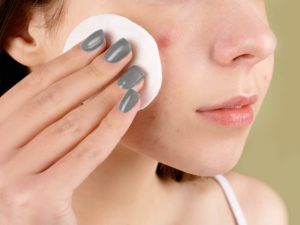Top 5 Ingredients and Treatment for Oily Skin
And a surprising bonus ingredient you won’t expect!
If you have oily skin, then you’re probably familiar with trying to look matte and less greasy.
The dewy look isn’t in if you look too oiled up.

You can blot all you want to try and wipe the excess shine away, but the most important step to take is creating a routine that targets the issue.
Skincare is absolutely vital and learning how to use the right treatments can be vital.
Check out these amazing ingredients that can help you get rid of that excess shine today!
Causes of Oily Skin
Some individuals may naturally have a tendency towards oily skin but other factors such as stress, hormone fluctuations, and certain medications can cause excess sebum production.
Oily skin may be a reaction to over scrubbing your skin to get rid of excess sebum.
Check out ingredients that get to the root of the problem below.
Retinol
Retinol is derived from vitamin A and is commonly used as an antiaging ingredient in many skin care products.
However, retinol is also a great treatment option for acne and oily skin.
Retinol is alarming increasing cell turnover, bringing new skin cells to the surface. By penetrating deep into the skin, it can increase the production of elastin and collagen.
It has an exfoliating effect on the skin’s surface, helping improve texture and overall tone.
This whole process can help unclog pores and remove dead skin cells.
Remember to use only in the PM and it increases skin sensitivity, and to start with a once-a-week application or a low concentration. Do not use it with products that have vitamin C, as they work at different pH levels. Using both at the same time will reduce the effectiveness of both.
It may reduce too much oil in the skin as individuals who overuse it tend to experience dryness and flakiness.
Salicylic Acid
Salicylic Acid is a beta hydroxy acid that has anti-inflammatory and antibacterial properties due to its exfoliating nature.
It can help reduce redness and swelling, unplug pores, and exfoliate to remove dead skin cells.
It is a great option for oily skin but take note of how you use it; as a cleanser, it should be fine to use every day but as a leave-in treatment, try at most 3 times a week as it can lead to over-exfoliation and dryness.
Niacinamide
Niacinamide is derived from vitamin B3. It can support the collagen of the skin and has great soothing and anti-inflammatory properties.
Even better, niacinamide has been proven to lower excess oil production throughout a four-week study.
This comes in serums and is a popular product in many moisturizers.
Glycolic Acid
Glycolic acid is a water-soluble alpha-hydroxy acid (AHA) made from sugar cane. They are small molecules that are easily absorbed into the skin, improving texture, smoothing, and brightening the skin.
Glycolic acid has an exfoliating effect which can help remove dead skin cells and fight breakouts.
Glycolic acids can be found in cleansers, lotions, or serums.
Try it as a cleanser to see if your skin reacts well to the ingredient before leaving it on like a serum. Remember to use it once or twice a week to avoid over-exfoliation.
Clay
Clay is a great option for absorbing oil and leaving the skin feeling smooth and refreshed.
Many clay masks have additional properties to treat blackheads and other acne concerns, making them a great option for individuals with oily skin.
Remember, these masks tend to reduce the moisture in your skin, so don’t leave the mask for too long, and make sure to follow up with a good moisturizer.
And the Bonus Ingredient!
Hyaluronic Acid
Hydrating is important as oily skin can be caused by dehydration of the skin.
This lack of moisture causes your skin to overproduce oil to compensate.
Oily skin, just as any other, needs to be hydrated and moisturized.
When using hyaluronic acid, try to make sure it’s in serum with non-comedogenic ingredients and layer it under a gel or lightweight moisturizer.
The Takeaway
Skin is awesome and we should all endeavor to protect it! A great way to do so is to treat problem areas with ingredients that will give you the healthy glow you want.
For oily skin, using ingredients that treat the cause of the problem is highly important.
Exfoliation is just as important as hydrating and nourishing the skin.
Being too rough with the skin can actually lead to your skin overcompensating and producing more oil.
Make sure to patch test any new ingredient on your forearm first to ensure you don’t have a negative reaction and introduce new ingredients one at a time.





